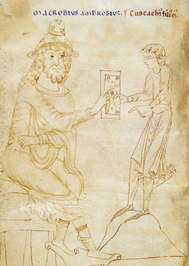Macrobius
Genre
More books by Macrobius…
“Certain portions of the earth, escaping utter destruction, become the seedbeds for replenishing the human race, and so it happens that on a world that is not young there are young populations having no culture, whose traditions were swept away in a debacle; they wander over the earth and gradually put aside the roughness of a nomadic existence and by natural inclunation submit to communities and associations; their mode of living is at first simple, knowking no guile and strange to cunning, called in its early stage the Golden Age. [16] The more these populations progress in civilization and employment of the arts, the more easily does the spirit of rivalry creep in, at first commendable but imperceptibly changing to envy; this, then, is responsible for all the tribulations that the race suffers in subsequent ages. So much for the vicissitudes that civilizations experience, of perishing and arising again, as the world goes on unchanged.
[Chapter X - 15,16]”
― Commentary on the Dream of Scipio
[Chapter X - 15,16]”
― Commentary on the Dream of Scipio
“(…) il existe des hordes sauvages qui ont perdu jusqu'à la trace des connaissances de leurs ancêtres. Insensiblement leurs mœurs s'adoucissent ; elles se réunissent sous l'empire de la loi naturelle : l'ignorance du mal et une franchise grossière leur tiennent lieu de vertus. Cette époque est pour elle le siècle d'or. L'accroissement des arts et de l'industrie vient bientôt après donner plus d'activité à l'émulation ; mais ce sentiment si noble dans son origine produit bientôt l'envie, qui ronge sourdement les cœurs. Dès lors commencent, pour cette société naissante, tous les maux qui l'affligeront un jour.
Telle est l'alternative de destruction et de reproduction à laquelle est assujetti le genre humain, sans que la stabilité du monde en souffre.”
― Commentary on the Dream of Scipio
Telle est l'alternative de destruction et de reproduction à laquelle est assujetti le genre humain, sans que la stabilité du monde en souffre.”
― Commentary on the Dream of Scipio
“Since, from the Supreme God Mind arises, and from Mind, Soul, and since this in turn creates all subsequent thungs and fills them all with life....and since all things follow in continuous succession, degenerating in sequence to the very bottom of the series, the attentive observer will discover a connexion of parts, from the Supreme God down to the last dregs of things, mutually linked together and without a break. And this is Homer's golden chain, which God, he says, bade hang down from heaven to earth.”
―
―
Topics Mentioning This Author
| topics | posts | views | last activity | |
|---|---|---|---|---|
| The History Book ...: SPQR - A HISTORY OF ANCIENT ROME - BIBLIOGRAPHY ~ Spoiler Thread | 25 | 89 | Jun 17, 2017 02:13PM |
Is this you? Let us know. If not, help out and invite Macrobius to Goodreads.






















